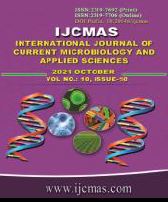


 National Academy of Agricultural Sciences (NAAS)
National Academy of Agricultural Sciences (NAAS)

|
PRINT ISSN : 2319-7692
Online ISSN : 2319-7706 Issues : 12 per year Publisher : Excellent Publishers Email : editorijcmas@gmail.com / submit@ijcmas.com Editor-in-chief: Dr.M.Prakash Index Copernicus ICV 2018: 95.39 NAAS RATING 2020: 5.38 |
Pseudomonas aeruginosa Migula is an opportunistic bacteria that lives in soil, water, and even in environments like hot tubs. In present research work studies were conducted on two cultivars of Chenopodium quinoa. Willd was treated with the Strains of Pseudomonas aeruginosa Migula cultured and maintained on nutrient agar medium. Production of the roots and root lets were affected by treatment of PGPR and high number of root lets were reported in 15 days seedlings of Chenopodium quinoa Willd. This Pseudomonas aeruginosa Migula play an important role in soil fertility thus effectively solubilizes fixed phosphorus to exchangeable form and enables solubilization of Phosphorus in soil. Natural Phosphorus solubilization of Pseudomonas aeruginosa Migula improves both plant and soil health and also aids in soil remediation. The population of beneficial Pseudomonas aeruginosa Migula increases the organic content of soil improves soil fertility. Plant Growth Promoting Rhizobacteria (PGPR), plays an important role in improving plant growth. The comprehensive understanding of bacterial plant growth promoting mechanism helps to get sustainable agriculture production under biotic and a biotic stress. PGPR are beneficial for plant growth and also referred as yield increasing bacteria. Treatments with PGPR increases germination percentage, seedling vigor, emergence, plant stand, root and shoot growth, total biomass of the plants, seed weight, early flowering, grains etc., Inoculation of Pseudomonas aeruginosa Migula in agricultural fields improves the uptake of P and N in plants with an increase in leaf chlorophyll, total soluble protein and plant biomass production.
 |
 |
 |
 |
 |